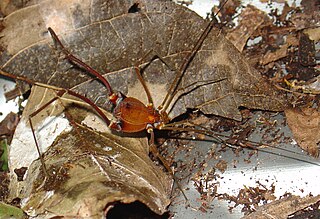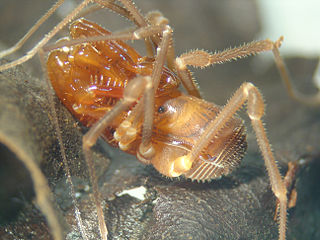Related Research Articles

Gonyleptoidea is the most diverse superfamily of the Grassatores. It includes around 2,500 species distributed in the Neotropics. They are characterized by the simplified male genitalia, with the glans free subapical in the truncus.

Cosmetidae is a family of harvestmen in the suborder Laniatores. With over 700 species, it is one of the largest families in Opiliones. They are endemic of the New World with a Nearctic-Neotropical distribution where a large fraction of the diversity of Opiliones are represented by this single family. Cosmetidae have the northern extent of their range into the USA, where a small number species occur in the southern states. However, the family is especially diverse in Mexico, Central America and northern South America; especially the Andean realms. Their range also extends further south into Argentina and southern Brazil, but they are absent in Chile. Cosmetidae are prevalent in Amazonian region, but only relatively few also occur in Brazilian Atlantic Forest. Several species are also found in the Caribbean.

The Phalangiidae are a family of harvestmen with about 380 known species. The best known is Phalangium opilio. Dicranopalpus ramosus is an invasive species in Europe.

The Sclerosomatidae are a family of harvestmen with about 1,300 known species. One former subfamily has been recently removed to form a new family, Globipedidae.
The Stygnopsidae are a small family of harvestmen, with almost all species found in Mexico.
The Stygnidae are a family of neotropical harvestmen within the suborder Laniatores.
The Manaosbiidae are a family of neotropical harvestmen within the suborder Laniatores.

The Cranaidae are a family of neotropical harvestmen within the suborder Laniatores.
Kimulidae is a small neotropical family of the harvestman infraorder Grassatores with about thirty described species.

Stygnommatidae is a small neotropical family of the harvestman infraorder Grassatores with about thirty described species.

Samoidae is a family of the harvestman infraorder Grassatores with about fifty described species.
Biantidae is a family of the harvestman infraorder Grassatores with about 130 described species.

The Travuniidae are a small family of harvestman with little more than ten described species, within the suborder Laniatores.
Eutimesius is a genus of harvestmen in the family Stygnidae with five described species. All species are found in South America.

Stygnomma is a genus of armoured harvestmen in the family Stygnommatidae. There are more than 30 described species in Stygnomma.
Metasarcidae is a family of harvestmen, first described by Adriano B. Kury in 1994.